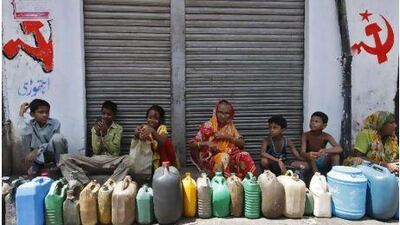NEW DELHI // India should revamp its welfare system by replacing its inefficient subsidy programme with direct cash transfers, says a new World Bank report in support of a proposal made this year by India's finance minister.
India spends roughly 2 per cent of its $1.38 trillion (Dh5 trillion) gross domestic product on social welfare and subsidy programs - including nearly $13.4 billion on food subsidies alone - every year. But the effects of this spending on the Indian poor have remained limited, because of corruption and a lack of administrative efficiency.
The finance minister, Pranab Mukherjee, admitted as much when he presented his annual budget in March, noting a "drift in governance and a gap in public accountability". The idea of cash transfers, as mooted by Mr Mukherjee and the World Bank, is intended to address these problems of corruption and administration.
The World Bank report particularly advocates cash transfers to replace or supplement the existing public distribution system for subsidised food grains. Inefficiencies in procurement and transport within this system have allowed grains to be diverted to the black market or simply languish in storage silos.
Last summer, it was discovered that nearly 50,000 tonnes of wheat were rotting in warehouses in the state of Punjab alone, prompting the Supreme Court to admonish the government and issue instructions to give the grain away for free if necessary. "In a country where people are starving," a two-judge bench said last July, "it is a crime to waste a single grain."
The World Bank report concludes that "regular cash grants are subject to less leakage than food in nearly all cases, are far easier to administer, and are highly valued by the poor."
The vision statement for the government's 12th five-year plan, a road map for the economy between 2012 and 2017, makes similar recommendations for cash transfers instead of kerosene and cooking gas subsidies.
A member of the Planning Commission, Saumitra Chaudhuri, has told the Business Standard newspaper that replacing fertiliser subsidies with cash transfers would be more complicated as landowners in India are not always the farmers whom the subsidies are supposed to benefit.
However, transferring cash to poor families is expected to become easier with the continued roll-out of Aadhaar, a government-led identification programme that will assign 12-digit numbers to everybody in India. A massive database will match those numbers up with basic personal details and biometric information.
Aadhaar's field agents, similar to census-takers, began to enrol people last September. Aadhaar is expected to enrol 600 million people over the next four years.
The Reserve Bank of India estimates that only 40 per cent of Indians have access to formal banking infrastructure; large parts of rural India remain underserved.
In an interview in Mint newspaper, Ashok Pal Singh, the deputy director general of the Unique Identification Authority of India, estimated that five million Aadhaar-linked bank accounts would be opened in the next three months, mostly in rural India. Eight out of 10 enrolled in the programme, Mr. Singh said, asked for bank accounts.
Proposals of cash transfers have been circulating for at least seven years in India, said Dr Parth Shah, president of the Centre for Civil Society, a New Delhi-based research organisation. "But I think there's some truth to the fact that the talk is more consistent now because of Aadhaar, which makes it easier to transfer this money" to the poor.
At present, the number of families living below the poverty line in each state is estimated by the Planning Commission; there are nearly 65 million such families in India. But it is left to the state governments to identify these families and hand out cards, identifying them as living below the poverty line, that allow them to purchase subsidised food and fuel. Most welfare schemes are linked to this card.
Corruption, however, is a problem with the card system. In February, for example, the comptroller and auditor accused the food and civil supplies department of the state of Karnataka of issuing thousands of fake cards. The cost to the state's exchequer was estimated to be roughly $400 million.
Yamini Aiyar, director of the Accountability Initiative at the Centre for Policy Research, a Delhi-based think tank, said: "So if you can't figure out who the poor are, and who deserves [the] cards, how can you assume that cash transfer will work and that the cash will reach them?"
This issue is especially problematic in agriculture, said Himanshu, an economics professor at Jawaharlal Nehru University, who uses only one name. More than half the country is dependent on agriculture for a livelihood, he said, and most farmers who need subsidies are small and marginal farmers, often without the necessary deeds to the land they own or farm.
"These are the ones who are really stuck in agriculture, who need the money and have these problems," Mr Himanshu said. He also said that decisions on how much cash to transfer, depending on the area of tilled land or the nature of the soil or the crops grown, would complicate the delivery mechanism.
Dr Shah said transfers and subisides both have their problems.
"Targeting the poor effectively is a problem in both cases," he said. "With cash, you may start with large leaks due to corruption, but over time, it's possible to monitor and cut down these leaks. That's much harder to do with a public distribution system, which is why it hasn't been possible in the last 50 years."

